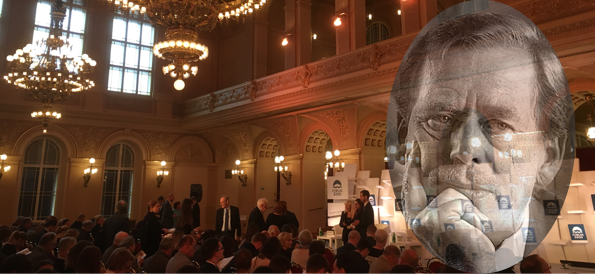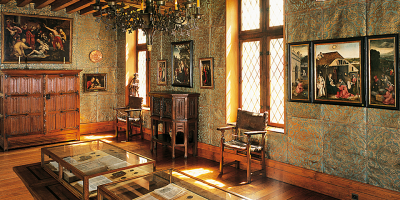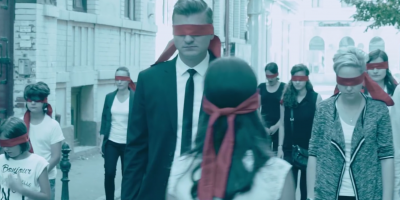He described himself as a man of paradox. He was a dissident playwright who became president of Czechoslovakia after the Velvet Revolution in 1989. His name was Vaclav Havel.
A political activist, he never wanted to become a politician. A writer about literature, he was not a literary critic. A playwright, he didn’t enjoy going to most theatre.
Although not an active believer, he saw the root problem of modern times as the ‘great departure from God’ in our world unparalleled in history. The world’s crisis in his view was directly related to the spiritual condition of modern civilisation, the loss of an experience of the transcendental and of any moral superpersonal authority.
“As soon as man began considering himself the source of the highest meaning in the world and the measure of everything,” he wrote in Disturbing the peace, “the world began to lose its human dimensions, and man began to lose control of it.”
Havel would have turned 80 this month had he not succumbed to several deteriorating physical conditions five years ago. Events commemorating his life and work are being held throughout this year in the Czech Republic.
Dialogue
Last week, the 20th Forum 2000 Conference was held in Prague, an event first initiated by Havel in 1997 to discuss the challenges humanity was facing on the threshold of a new millennium. Over these two decades, the forum has gathered hundreds of global political, intellectual, spiritual and business leaders to address issues concerning democracy, human rights, civil society and religious dialogue. These have included Henry Kissinger, Zygmunt Bauman, Elie Wiesel, Bill and Hillary Clinton, Boutros Boutros-Ghali, the Dalai Lama and Aung San Suu Kyi from Myanmar.
Those who arrived at Prague’s International Airport named after Havel, like myself, may have noticed a further paradox: he hated flying.
He also hated what was happening to his own Czechoslovakian society under communism. In the mid-1970’s, he began a campaign to awaken the conscience of the nation to refuse to live under the lie. He revived the cry of the 15th century Czech reformer, Jan Hus, and later made it his presidential motto: Truth prevails. Repeatedly he declared that ‘truth and love must prevail over lies and hatred’.
His campaign erupted in the Velvet Revolution on 1989 and overthrew the Communist regime. Havel, by popular acclaim, was sent to the palace as the nation’s president.
This was my second forum. Three things impressed me particularly. One was the passion and concern for justice and human rights by folk of all faiths and none. It made me reflect on the words of Jesus that ‘even the stones will cry out’. Or of those who said, ‘But Lord, when did we see you in prison…?’ I thought of the expression, common grace, by which theologians talk of God’s activity in the world outside of the church.
I was also impressed by the respect and openness to faith perspectives expressed by various speakers at the forum–a refreshing change to the cynicism and prejudice often encountered in Western Europe where intellectuals are not expected to ‘do God’. Havel observed from his own experience that a society that suppressed the metaphysical was dangerous. One forum session explored the paradox of religion which could both unite and divide.
Unbelievable
Last but not least was the role of women in agitating for justice. A film on the crucial but forgotten role women played in the Solidarity movement in Poland highlighted a story still being lived out today by courageous women worldwide. Some were present at the forum: from North Korea, Cuba, China, Russia, Saudi Arabia and Venezuela.
The paradox of our times, with populism, nationalism and authoritarianism on the rise, was explored by the Prime Minister of Slovakia, Andrej Kiska, in his opening message: “It seems unreal to imagine anyone who would not want Europe as a place of peace, now and forever. Only a madman would want to roll back the centuries of developments of human rights and civil society.” Yet, he continued, “today, many of us feel deeply worried that this unbelievable scenario is happening in front of our eyes. There is a clear and present danger which many of us thought we would not see reincarnated again. It is the rise of nationalism, extremism and racism. … We suddenly feel as if the unpleasant history of Europe is returning.”
The forum programme introduction read: Today´s democratic leadership seems to be in crisis. Are the current democratic systems unable to generate true leaders? Is the growing authoritarianism in the world a result of the weakness of democratic leadership? Where are the Havels, Churchills, or Mandelas of today?
You can watch for yourself the forum videos here to find your own answers to these pressing questions.
P.S. The first Schuman Salon event in Brussels is the excursion this coming Saturday, October 29, to the Erasmus House in Anderlecht, two days after Erasmus’ birthday and two days before Reformers’ Day. Theme: Erasmus and the Reformation. All welcome at Blvd Charlemagne 37, 14.00-18.00.
Till next week,



